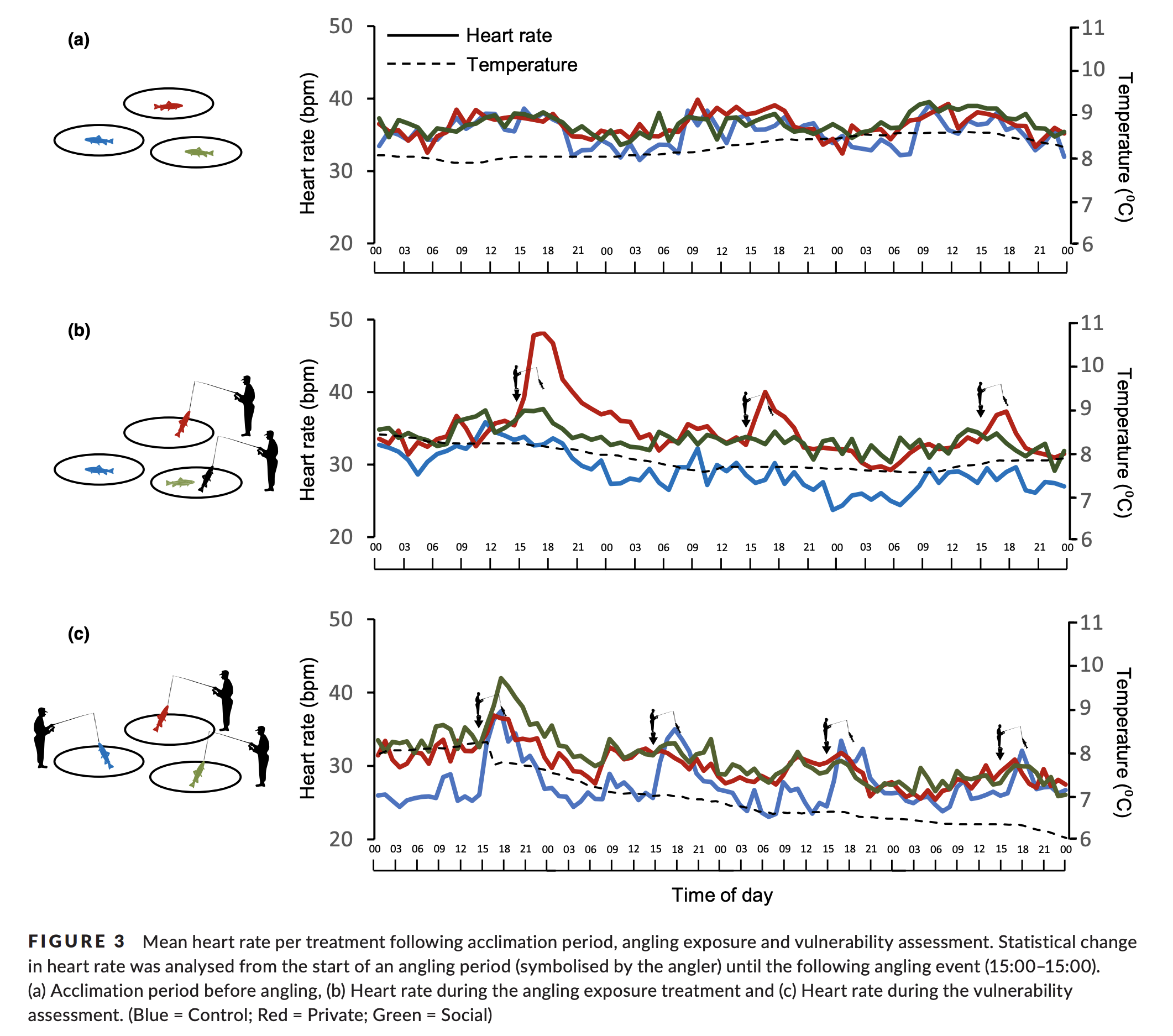Do Other Fish Know When A Fish Gets Hooked?
Let's talk about the social cues a group responds to, or doesn't respond to, when a fish gets hooked.

May 2023
Sometimes when it's on, it's just on. On certain days, you can throw cast after cast and each feels like a magnet for any nearby fish. So do all those fish just not care that their brethren are getting yanked out of the water one by one, or are they even aware?
Let's talk about the social cues a group responds to, or doesn't respond to, when a fish gets hooked. Specifically rainbow trout, largemouth bass, carp, and pike. Four species that scientists have targeted for further research.
Rainbows and Largemouth
For rainbow trout and largemouth bass, research suggests that these species don't show social learning for hook avoidance. Meaning, when one fish gets hooked, his buddies don't react, or learn, or interpret elevated risks for themselves. The below figure shows how researchers determined this in rainbow trout. By examining heart rates in rainbow trout they were able to experimentally test how fish react to getting hooked, or seeing others get hooked. The graph (a) shows three different ponds with three isolated test fish (red, blue, green) in their resting state. Then the red fish was hooked and an introduced fish (black) was also hooked. The red fish was on his own, and the black fish was hooked to judge the response of the green fish, graph (b). You can see that the red fish shows an elevated heart rate in response to hooking. But what about the green fish? When his buddy, the black fish gets hooked, there is no difference in heart rate between a resting state and observing his buddy get hooked. This supports that rainbow don't gather social cues from their peers about angling risks. To confirm these findings, they also hooked all three fish (red, blue, green) and observed similar elevated heart rates in response to getting hooked, graph (c). A necessary confirmation.

Similar results have been shown for largemouth bass. But Carp seem to show different responses.
Carp and Pike
Possibly due to differences in feeding preferences, carp have different learning capabilities. Unlike trout or bass, most carp prey are mostly immobile. They feed on vegetation, small resting invertebrates, and generally graze for food. But carp are also more social. When similar tests have been conducted on carp, researchers have found that common carp learn social hook avoidance after several days of angling. During experimentation, only a fraction of a carp population was hooked, but bystander carp could see and learn from the hooked fish and learned how to avoid certain baits and hooks. Plus, there is even evidence that carp can remember these experiences for up to a year. Most interestingly, this research suggests that even if the hooked carp is harvested, the other fish will have still seen and learned from their fallen comrade.
Surprisingly, there is also evidence that Northern Pike can learn socially when other pike are hooked, and pike don't fit the mold of exhibiting intelligence comparable to carp. Nonetheless, over extended periods of angling on a pike lake, even non-captured fish became more wary in response to heavy angling pressure and learned to avoid being captured even if not captured themselves. I wonder what lures they were throwing to pike, because large splashy lures will likely be noticed by many surrounding fish more than a fly...
Conclusions
These findings may offer anglers an explanation as to why catch rates suffer at certain times for certain species, and help clarify fish behavior. Maybe this can even help to mend a bruised ego after a tough day of fishing.
Sources:
- Lovén Wallerius, M., et al. 2020. Hook Avoidance Induced by Private and Social Learning in Common Carp. https://afspubs.onlinelibrary.wiley.com/doi/pdf/10.1002/tafs.10246
- Lovén Wallerius, M., et al. 2019. Socially induced stress and behavioural inhibition in response to angling exposure in rainbow trout. https://sci-hub.ru/10.1111/fme.12373
- Arlinghaus, R. et al. 2017. Determinants of angling catch of northern pike (Esox lucius) as revealed by a controlled whole-lake catch-and-release angling experiment—The role of abiotic and biotic factors, spatial encounters and lure type. https://sci-hub.ru/10.1016/j.fishres.2016.09.009



